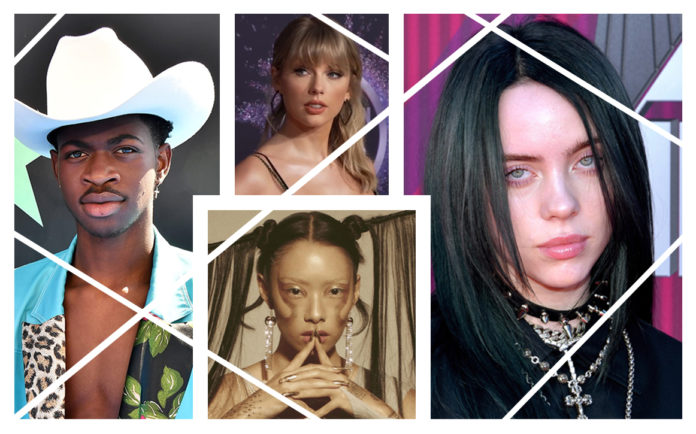Depending on who you ask, pop music can be a controversial subject. It refers to popular music by virtue of its name, implying it’s well-received and well-liked, yet it’s also used as an occasional weapon of superiority. “I don’t like pop music,” some critics will say. “It’s homogenous, repetitive, and formulaic.” Unfortunately, what often comes along with these justifiable criticisms of top-100 pop music is a disdainful attitude that disliking pop means you have more distinguished, complex taste in music. What goes unacknowledged is that pop can be just as emotionally-rich and diverse as any other genre — but it gets twice the hate.
What some might forget is that popular music has always existed in one form or another, and lots of older classics share the feature of being palatable, unchallenging, and loved by the masses. Frank Sinatra and Nat King Cole both feature beautiful vocals and stunning instrumentals, and have cemented themselves as legends — yet they were considered popular music in the ‘40s and ‘50s. Before rock and roll, they were the bread and butter of American pop at the time. According to St. James’ Encyclopedia of Popular Culture, with the rise of rock and roll came the increase in smaller, independent music companies, and a noted fragmentation of genres that makes “pop” today difficult to define.
At the same time, it should be acknowledged that subversive pop has been on an upward trend in the last decade. Billie Eilish has been said to have ridden “teenage weirdness to stardom,” according to the New York Times, with how she embraces her Tourette’s syndrome and mental health struggles, and produces a hypnotic musical blend of melancholy and pop. To many, her authenticity and goofiness challenge the idea that celebrities are idols who are always flawless and upbeat, and her music isn’t afraid to be macabre. For more niche examples of subversive pop songs, Rina Sawayama’s “XS” holds a mirror up to capitalism, and Lil Nas X’s “Montero” challenges the use of religion to shame sexuality. It’s hard to paint an argument that pop is meaningless and vapid when there are so many talented artists today pushing boundaries and expressing personal struggles through the genre.
Next to examine is the idea that all pop music sounds the same. To back this up, a 2012 study is often cited that examined over 450,000 pop songs from 1955 to 2010. What this study found is that there was indeed an increase in homogenization — meaning that there was less diversity in instrumentation and pitch patterns. What needs to be considered is that this study only focused on pop music, so what about other genres? Well, it turns out that a separate study of 15 genres and nearly 400 subgenres found that as genres gained popularity, they became more generic.
“This can be interpreted as music becoming increasingly formulaic in terms of instrumentation once commercial or mainstream success sets in,” the study said.
Although pop has a bad reputation for being bland and basic, it turns out that popularity does that to songs of practically any genre. What’s important is that it isn’t necessarily a bad thing. It could be seen as music distilling into its most captivating elements and capitalizing on what audiences want to hear. Doesn’t that mean generally better music as a trend over time? And in the end, there will always be experimentation within genres for listeners to enjoy, and they’re more accessible than ever because of the internet.
What I’m arguing is that pop is a lot more complex and diverse than anyone gives it credit for — and yet, what if it wasn’t? What if someone’s favourite songs are just a regurgitation of the top 100’s most formulaic, repetitive, popalicious pop songs? To that I’d simply say: cool. It’s important to remember that people listen to music for lots of different reasons. For some, music could be a way to unwind, relax, and let loose. Just because the songs they listen to aren’t instrumentally intricate or lyrically linguistic doesn’t mean their relationship with music isn’t deep, genuine, and real. If turning on Britney Spears makes you remember that time you snuck out with the girls and partied until the sun came up, that song has personal meaning to you that’s just as authentic as what the head-banging metal freak or the rock-loving boomer experiences.
No one should be able to label one’s taste in music as less sophisticated just for leaning toward pop. Like its name suggests, pop has always been popular music, but that doesn’t mean it’s lower in quality or worse at what it does. Music genres have fragmented and specialized to the point where it’s difficult to pinpoint exactly what “pop” is other than mainstream music that appeals to the masses. So, go out and enjoy your music without shame, fellow pop lovers.
Chandy is a biology major/chemistry minor who's been a staff writer, Arts editor, and Managing Editor at The Cascade. She began writing in elementary school when she produced Tamagotchi fanfiction to show her peers at school -- she now lives in fear that this may have been her creative peak.

